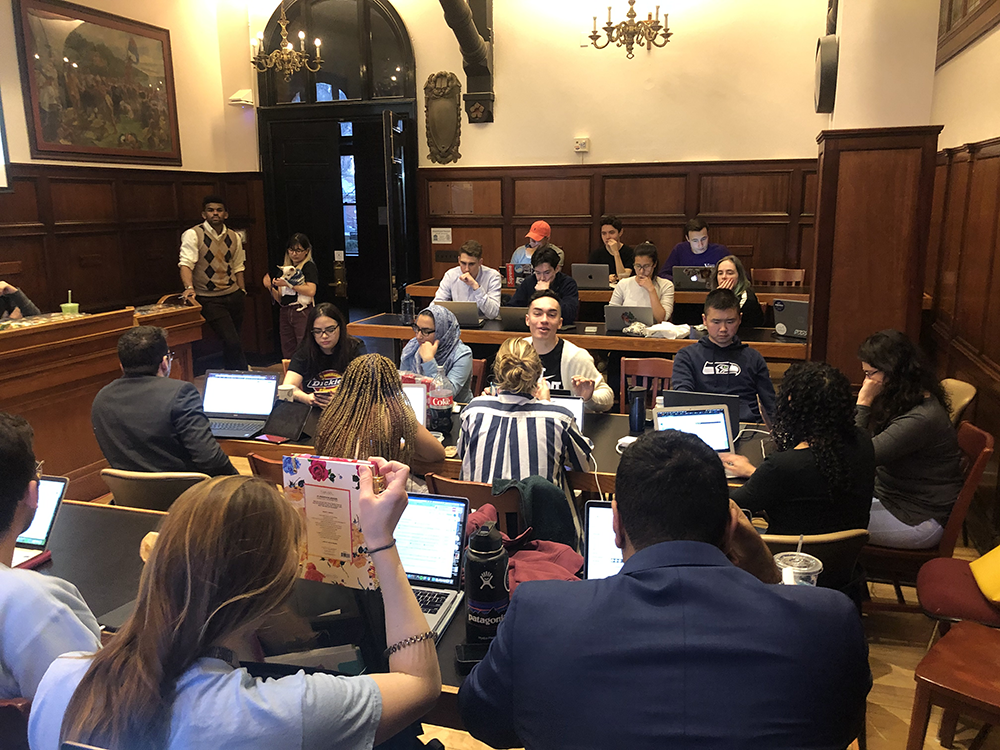Over two-thirds of respondents in a Georgetown University Student Association senate survey identify as ethnically nonwhite, according to an internal demographic survey presented at a Jan. 12 weekly senate meeting.
Senators have been required to fill out a demographic survey since a bylaw amendment introduced by the 2017-2018 GUSA senate, according to later legislation. The most recent dataset, obtained by The Hoya, shows 31% identify their ethnicity as white, 31% as Latino, 24% as Asian and 14% as black. The survey question about ethnicity received 29 responses, though 28 students currently serve on the senate.

The GUSA senate represents a student body that identified as 50.1% white during the 2018-2019 school year, according to data compiled by the National Center for Education Statistics, a research branch of the United States Department of Education.
In recent years, GUSA has become more effective at promoting diversity and inclusivity, according to Senator Eric Bazail-Eimil (SFS ’23).
“I think GUSA is definitely making steps in the right direction,” Bazail-Eimil wrote in an email to The Hoya. “As the electoral demographic information presented to us this past meeting showed, the Senate has clearly become far more diverse, representing far more communities than it did in years past.”
Past efforts to elevate inclusivity in GUSA included a campuswide referendum certifying that senators be elected by class instead of geographic location, intended to increase diversity in the senate in 2017.
The statistics also revealed that 60% of the 30 responses to a question about gender identity indicated male identity and 40% indicated female identity. Seven women won seats during last year’s spring senate elections, marking an increase in female representation compared to recent years. In the fall 2018 GUSA senate elections, which filled 14 senate seats, the student body elected only one woman, Hayley Grande (COL ’21). Additionally, the 2018-19 senate included an all-male freshman class. According to the National Center for Education Statistics, 55.9% of the Georgetown undergraduate community identifies as female.
Though GUSA has become more inclusive, it must continue its efforts to increase female representation in the senate, according to Bazail-Eimil.
“We still have progress to make in ensuring that women are represented in all the branches equitably,” Bazail-Eimil said. “But I credit this administration’s hard work at recruiting candidates of color and bringing in lots of people into the executive and other agencies from all parts of campus.”
The survey revealed that 37% of the 27 respondents to a question about sexual orientation identify as LGBTQ while 63% identify as straight. Additionally, 55% of 28 respondents to a question about religious identity identify as Christian and 43% identify as nonreligious, while 3.5% identify as Muslim and 3.5% identify as Hindu.
In a nod to GUSA’s growing diversity, Senator Zach Volpe (SFS ’23) recommended introducing legislation Jan. 12 that would push back GUSA’s Sunday meetings to 6 p.m. to accommodate students who want to attend Sunday religious services. Volpe indicated that the current GUSA meeting time was particularly an issue for Hindu students, as it conflicted with Weekly Āratī, a Hindu service held by Georgetown’s Dharmic Life on Sundays at 5 p.m.
This time change would accommodate both GUSA senators and members of the Georgetown student body interested in attending GUSA meetings, according to Volpe.
“I think part of this is making sure that all people of all faiths can attend public meetings and also feel comfortable to run for office knowing that they’re not going to have to compromise their religious practice for serving in public office,” Volpe said in an interview with The Hoya.
Volpe’s own involvement in the Hindu community on campus brought the time conflict to his attention, he said.
“The issue basically started with myself, in that I am both a practicing Lutheran and Hindu,” Volpe said. “I started talking to some other people in the Hindu community about this and they voiced that they felt that there was somewhat of an injustice.”
The new legislation will help the GUSA senate best serve the Georgetown community, GUSA Senator Eddie Galvan (MSB ’23) said.
“I think it’s important to take into consideration all of the groups across campus,” Galvan said in an interview with The Hoya. “We’re supposed to represent our student body.”
This proposed legislation would demonstrate GUSA’s commitment to representing the interests of all communities at Georgetown, according to Bazail-Eimil.
“I think this change will be a win-win for all Senators, regardless of their faith affiliation,” Bazail-Eimil wrote. “It would definitely show that GUSA gives important consideration to the needs of other communities, religious, ethnic, racial, etc. when forming policies and representing the student body.”




















